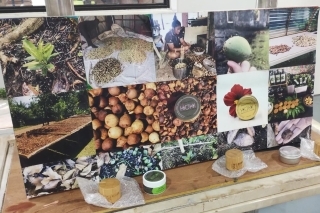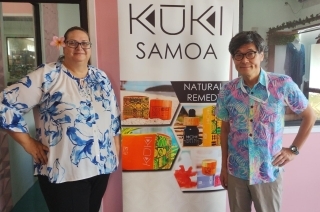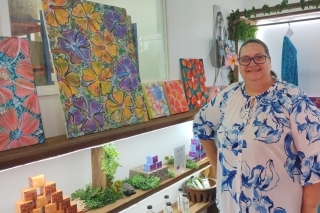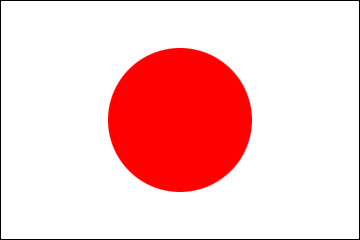From Ambassador (An effort to establish indigenous Skincare brand and export products from Pacific Island countries - a case of ‘KUKI’ in Samoa)
2025/1/16



An effort to establish indigenous Skincare brand and export products from Pacific Island countries - a case of ‘KUKI’ in Samoa
I was at ‘KUKI’s factory, a skincare company which Ms Maria Leota established.
Maria is from Queensland, Australia. She was a schoolteacher and has also served as a school principal. She is married with a Samoan husband and has lived here for some years. She is also an Executive Member of the Samoa Chamber of Commerce and President of the Samoa Association of Manufacturers and Exporters.
I learned about her through a social media before and, by chance, happened to encounter her at the gym of Taumeasina island resort the other day.
It was her own experience that inspired her to use natural materials from Samoa. One of her children got a burn on his face. She tried out an ointment made from charcoal, a local remedy recommended by the villagers. That was so effective, and it made him recover quickly without leaving a scar.
The nuts from a certain a local tree called Fetau can also produce oil that contains compounds that soothe and heal the skin.
The original oil extract has a dark brown colour. It doesn't look very appealing as a skincare product, to be honest, but its effectiveness is outstanding.
According to Maria, efforts are already made to produce similar products in Vanuatu, but there they use synthetic agents to enhance the colouring. Maria, on the other hand, would like to avoid using synthetic materials in her products.
Fetau is a plant that grows on the sandy beaches by the sea, but unlike coconut palms, the local people do not understand the medicinal value of its fruit. It is possible to collect them directly from the beach, but it would be a labour-intensive process. Some villages are already short of young people whom she can count on as workforce. (They tend go abroad nowadays to earn money..)
So Maria started to plant trees on a farm, cultivate them and later harvest the nuts.
The fetau oil extracts obtained in this way can be exported as a raw material. In fact, the company has received inquiries from manufacturers in the United States. However, as this alone would not be very profitable as a business, she decided to launch their own skincare product line.
The company also sell their products on the domestic market, but with the help of ITC (International Trade Centre), she is now working on branding their products and securing sales channels overseas. The company already secured contracts to sell their products in Hongkong, and Macau. She also plans to take part in a skincare product fair in Italy in coming months with ITC’s support.
“We also sell online”, she says. She receives inquiries from NZ, Australia, and the UK, among others. However, the shipping costs from Samoa are expensive. Also, the sales revenue cannot be received here in Samoa, and it has to be through an account in NZ. (Currently, local financial institutions are not able to provide services to facilitate for such online sales.)
In Europe, Japan, and other countries, there are various regulations regarding product safety, sustainability, etc. for the sale of this type of skincare products. So it is not easy to export from a place like Samoa. Coconut oil, for example, used in blending products, contains impurities mixed in during the manufacturing process, so you cannot export the products, as it is. (The company can export it only as raw materials and let someone else do the manufacturing overseas.) To meet European standards, the company also had to invest in establishing a small laboratory for various product tests.
“It is not easy for a small startup like ours to start an export-oriented business in Samoa. Some people advised us that it is impossible unless we have ‘a deep pocket’, meaning a lot of capital to invest. In fact, during the COVID-19 period, we were unable to secure young labor force, and we had to significantly reorganize and refocus our business. However, I am now positive and hopes to overcome the various challenges one by one.”
Incidentally, people from PIC (Pacific Island Centre) in Japan have also visited her company. They showed great interest in the products and said they wanted to introduce them in Japan. But she declined, since she knew there were many obstacles to overcome before the company could sell the products in Japan. She thought it would be bad if they introduced the products only to find that they couldn't sell them in Japan.
I was at ‘KUKI’s factory, a skincare company which Ms Maria Leota established.
Maria is from Queensland, Australia. She was a schoolteacher and has also served as a school principal. She is married with a Samoan husband and has lived here for some years. She is also an Executive Member of the Samoa Chamber of Commerce and President of the Samoa Association of Manufacturers and Exporters.
I learned about her through a social media before and, by chance, happened to encounter her at the gym of Taumeasina island resort the other day.
It was her own experience that inspired her to use natural materials from Samoa. One of her children got a burn on his face. She tried out an ointment made from charcoal, a local remedy recommended by the villagers. That was so effective, and it made him recover quickly without leaving a scar.
The nuts from a certain a local tree called Fetau can also produce oil that contains compounds that soothe and heal the skin.
The original oil extract has a dark brown colour. It doesn't look very appealing as a skincare product, to be honest, but its effectiveness is outstanding.
According to Maria, efforts are already made to produce similar products in Vanuatu, but there they use synthetic agents to enhance the colouring. Maria, on the other hand, would like to avoid using synthetic materials in her products.
Fetau is a plant that grows on the sandy beaches by the sea, but unlike coconut palms, the local people do not understand the medicinal value of its fruit. It is possible to collect them directly from the beach, but it would be a labour-intensive process. Some villages are already short of young people whom she can count on as workforce. (They tend go abroad nowadays to earn money..)
So Maria started to plant trees on a farm, cultivate them and later harvest the nuts.
The fetau oil extracts obtained in this way can be exported as a raw material. In fact, the company has received inquiries from manufacturers in the United States. However, as this alone would not be very profitable as a business, she decided to launch their own skincare product line.
The company also sell their products on the domestic market, but with the help of ITC (International Trade Centre), she is now working on branding their products and securing sales channels overseas. The company already secured contracts to sell their products in Hongkong, and Macau. She also plans to take part in a skincare product fair in Italy in coming months with ITC’s support.
“We also sell online”, she says. She receives inquiries from NZ, Australia, and the UK, among others. However, the shipping costs from Samoa are expensive. Also, the sales revenue cannot be received here in Samoa, and it has to be through an account in NZ. (Currently, local financial institutions are not able to provide services to facilitate for such online sales.)
In Europe, Japan, and other countries, there are various regulations regarding product safety, sustainability, etc. for the sale of this type of skincare products. So it is not easy to export from a place like Samoa. Coconut oil, for example, used in blending products, contains impurities mixed in during the manufacturing process, so you cannot export the products, as it is. (The company can export it only as raw materials and let someone else do the manufacturing overseas.) To meet European standards, the company also had to invest in establishing a small laboratory for various product tests.
“It is not easy for a small startup like ours to start an export-oriented business in Samoa. Some people advised us that it is impossible unless we have ‘a deep pocket’, meaning a lot of capital to invest. In fact, during the COVID-19 period, we were unable to secure young labor force, and we had to significantly reorganize and refocus our business. However, I am now positive and hopes to overcome the various challenges one by one.”
Incidentally, people from PIC (Pacific Island Centre) in Japan have also visited her company. They showed great interest in the products and said they wanted to introduce them in Japan. But she declined, since she knew there were many obstacles to overcome before the company could sell the products in Japan. She thought it would be bad if they introduced the products only to find that they couldn't sell them in Japan.
